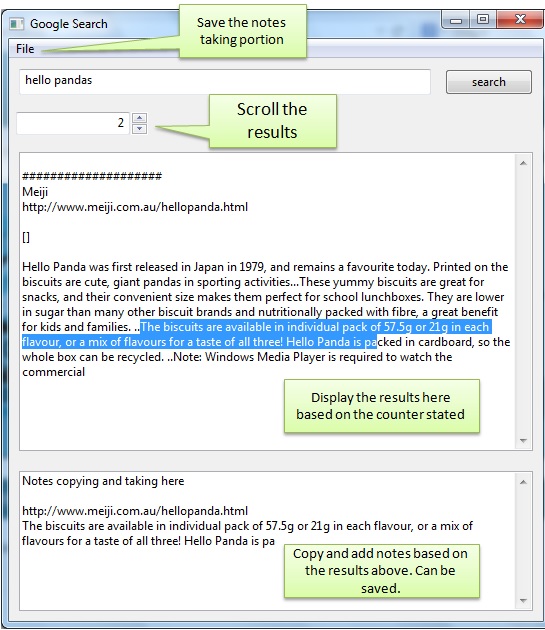Added 2 new features to Google search results web crawler. This is continuation of previous work on web crawler with Pattern. The script can be found at GitHub.
The first feature is to return the google search results sorted by date relevance. To turn on the date filter manually in google search, the following url string (“&as_qdr=d“) is appended. The following website provide more information on this. For the script based crawler, the url string to be appended is “&tbs=qdr:d,sbd:1” which will sort the date in descending, i.e, the most current date first.
The 2nd feature is the enable_results_converging options where it will merge all results from a list of keyword search. The merging is such that the top results from each search keyword are grouped together, i.e, it will list all the #1 search together followed by the #2 and so forth.
A sample run of the script is as below. The date filtered is turn off in this case. The example focus on fetching all the news from a particular stock “Sheng Siong” by searching for multiple keywords. It is assumed the most relevant are grouped at the top list hence consolidating all the same ranked results will provide more useful information.
print 'Start search'
## User options
NUM_SEARCH_RESULTS = 5 # number of search results returned
search_words = ['Sheng Siong buy' , 'Sheng Siong sell', 'Sheng Siong sentiment', 'Sheng Siong stocks review', 'Sheng siong stock market'] # set the keyword setting
## Create the google search class
hh = gsearch_url_form_class(search_words)
## Set the results
hh.set_num_of_search_results(NUM_SEARCH_RESULTS)
#hh.enable_sort_date_descending()# enable sorting of date by descending. --> not enabled
## Generate the Url list based on the search item
url_list = hh.formed_search_url()
## Parse the google page based on the url
hh.parse_all_search_url()
hh.consolidated_results()
print 'End Search'
Top 5 Output are displayed as below. The link from google results + the descriptions are printed. Note that there are repeated entry as there are some keywords that return the exact website. Further work is on-going to remove the duplicates.
================
Results=================
link: http://www.shengsiong.com.sg/
Description:
Sheng Siong
****
link: http://www.shengsiong.com.sg/
Description:
Sheng Siong
****
link: http://www.sharejunction.com/sharejunction/listMessage.htm%3FtopicId%3D10021%26msgbdName%3DSheng%2520Siong%26topicTitle%3DSheng%2520Siong
Description:
ShareJunction – Stock Forum Messages : Sheng Siong
****
link: https://sg.finance.yahoo.com/echarts%3Fs%3DOV8.SI
Description:
Sheng Siong Share Price Chart | OV8.SI – Yahoo! Singapore Finance
****
link: http://sbr.com.sg/source/motley-fool-singapore/here-are-5-things-you-should-know-about-sheng-siong
Description:
Here are 5 things you should know about Sheng Siong | Singapore …
****
link: Sheng+Siong+buy&hq=Sheng+Siong+buy&hnear=0x31da1767b42b8ec9:0x400f7acaedaa420,Singapore
Description:
Local business results for Sheng Siong buy near Singapore
****
Further works include scraping the individual sites for more details much like what is done in the post with Scrapy. The duplicates entries will also be addressed.
